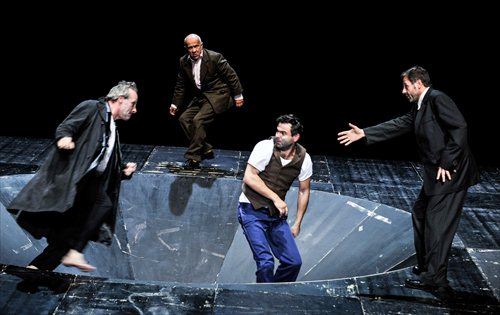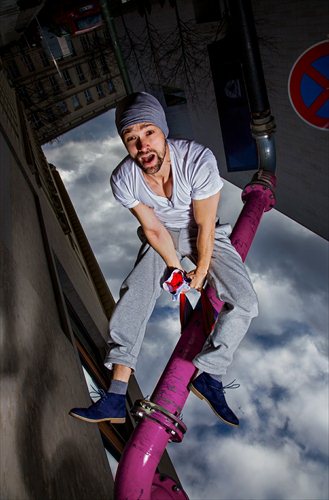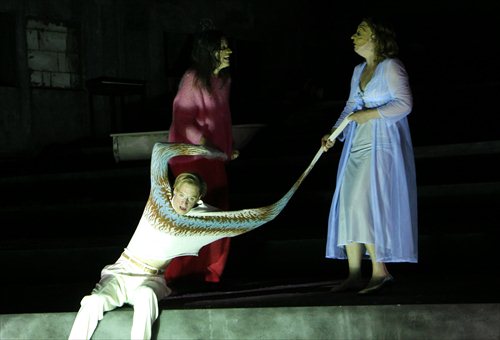HOME >> METRO SHANGHAI, ARTS
Meeting German theater in Shanghai
Source:Global Times Published: 2016/5/18 18:28:01
This year three plays from Germany's highlight annual theater festival, the Berliner Theatertreffen, will debut in Shanghai for the first Theatertreffen China.
The new bi-national festival, organized by Wu Promotion and Berliner Theatertreffen, will stage Waiting for Godot, Ibsen's John Gabriel Borkman and the German play Common Ground at Daning Theatre from June 24 to July 4.
First held in 1964, Berliner Theatertreffen is one of the most important theater events in German-speaking countries.
Each May, Berliner Theatertreffen stages the 10 "most noteworthy" new productions from across Germany, Austria and Switzerland the previous season.
Much like the process in selecting productions for the Berlin festival, each year a jury committee is to choose three dramas from the German event to stage here.
The five jurors of the first Theatertreffen in China are Chen Ping, cultural counselor of the Chinese Embassy in Germany; Shen Lin, director of the Drama Institute at the Central Academy of Drama; Qiang Zhaohui, German language scholar and translator; Thomas Oberender, director of Berliner Festspiele, the German festival's parent organization; and Yvonne Büdenhölzer, director of Berliner Theatertreffen.
This year they will stage Deutsches Theater in Berlin's version of Waiting for Godot, Maxim Gorki Theatre Berlin's Common Ground and Deutsches Schauspielhaus Hamburg's John Gabriel Borkman.

A street. A tree. Evening. Two pairs of people, Wladimir and Estragon, Pozzo and Lucky. Sometimes a young man passes by and nothing more. What remains is waiting and the dialogue to kill time.
Although Waiting for Godot is a familiar story, this version does without props.
The two have-nots Wladimir and Estragon possess neither shoe, hat nor carrot to kill their time. Pozzo and Lucky also have no rope, no whip, no suitcase - nothing at all.
With no props, it opens up the freedom of pure acting, and more space for actors to interpret the loneliness and boredom.
"Pozzo and Lucky stand for effectiveness, while the pair of Estragon and Wladimir are the opposite," the newspaper Berliner Morgenpost quoted the director as saying. "Later, man knows that Godot will not come. It is about waiting, but about Godot."

Common Ground is a play that questions the identity of migrants and in some way reflects the current crisis about it across Europe.
Born in 1976 in Jerusalem, director Yael Ronen comes from a drama family. She is good at using black humor within the frame of historic conflicts. Common Ground is her reflection about the wars in former Yugoslavia.
In the early 1990s, people from the former Yugoslavia began fleeing to Berlin - on the run, in search of work, for another life.
How do these Berliners experience the conflicts today? Here the children of the victims of war crimes live alongside the children of the perpetrators. How do they interact?
These questions are posited here by Maxim Gorki Theatre.
Interestingly, Ronen made the theater itself a social gathering by bringing together performers who came to Berlin from Belgrade and Sarajevo, Novi Sad and Prijedor.
A fantastic young ensemble including powerful actresses and actors as Anastasia Gubereva, Taner Sahintürk and Dimitrij Schaad were invited to the play. Many of them have Turkish, Russian or Serbian parents. What will be their common ground?
The play begins with a trip to Bosnia and how the characters met their relatives on their journey.

John Gabriel Borkman is the second-to-last play that Henrik Ibsen wrote before his death in 1906, and is regarded as one of the Norwegian's best.
Though written more than a century ago, the social problems touched on in the play also exist in today's society.
John Gabriel Borkman is a former bank manager who was imprisoned 16 years ago for financial fraud.
Since parole eight years ago, Borkman has been living on the property of his wife's twin sister, Ella. Ella was once Borkman's love interest, but for some reason he married Gunhild, her sister.
Borkman and his wife live on two separate floors, Gunhild on the floor below, and Borkman above. The two have no contact with each other. Their son, Erhart, who was raised by Ella, is now in his 20s.
At the beginning of the play, the gravely ill Ella has comes to ask Erhart to live with her. Borkman agrees, but Gunhild refuses to let Ella stake her claim over her son. The hostile sisters hate each other and try to take Erhart from the other, believing this is love.
In the interpretation of director Karin Henkel and stage designer Katrin Nottrodt, the realms of upstairs and downstairs are melted into one dismal, unfurnished room made of concrete. The actors are masked and wear ghostlike makeup, like the cursed undead who cannot find peace and therefore leave no one else in peace either.
The new bi-national festival, organized by Wu Promotion and Berliner Theatertreffen, will stage Waiting for Godot, Ibsen's John Gabriel Borkman and the German play Common Ground at Daning Theatre from June 24 to July 4.
First held in 1964, Berliner Theatertreffen is one of the most important theater events in German-speaking countries.
Each May, Berliner Theatertreffen stages the 10 "most noteworthy" new productions from across Germany, Austria and Switzerland the previous season.
Much like the process in selecting productions for the Berlin festival, each year a jury committee is to choose three dramas from the German event to stage here.
The five jurors of the first Theatertreffen in China are Chen Ping, cultural counselor of the Chinese Embassy in Germany; Shen Lin, director of the Drama Institute at the Central Academy of Drama; Qiang Zhaohui, German language scholar and translator; Thomas Oberender, director of Berliner Festspiele, the German festival's parent organization; and Yvonne Büdenhölzer, director of Berliner Theatertreffen.
This year they will stage Deutsches Theater in Berlin's version of Waiting for Godot, Maxim Gorki Theatre Berlin's Common Ground and Deutsches Schauspielhaus Hamburg's John Gabriel Borkman.

A scene from Waiting for Godot
Waiting for GodotA street. A tree. Evening. Two pairs of people, Wladimir and Estragon, Pozzo and Lucky. Sometimes a young man passes by and nothing more. What remains is waiting and the dialogue to kill time.
Although Waiting for Godot is a familiar story, this version does without props.
The two have-nots Wladimir and Estragon possess neither shoe, hat nor carrot to kill their time. Pozzo and Lucky also have no rope, no whip, no suitcase - nothing at all.
With no props, it opens up the freedom of pure acting, and more space for actors to interpret the loneliness and boredom.
"Pozzo and Lucky stand for effectiveness, while the pair of Estragon and Wladimir are the opposite," the newspaper Berliner Morgenpost quoted the director as saying. "Later, man knows that Godot will not come. It is about waiting, but about Godot."

A scene from Common Ground
Common GroundCommon Ground is a play that questions the identity of migrants and in some way reflects the current crisis about it across Europe.
Born in 1976 in Jerusalem, director Yael Ronen comes from a drama family. She is good at using black humor within the frame of historic conflicts. Common Ground is her reflection about the wars in former Yugoslavia.
In the early 1990s, people from the former Yugoslavia began fleeing to Berlin - on the run, in search of work, for another life.
How do these Berliners experience the conflicts today? Here the children of the victims of war crimes live alongside the children of the perpetrators. How do they interact?
These questions are posited here by Maxim Gorki Theatre.
Interestingly, Ronen made the theater itself a social gathering by bringing together performers who came to Berlin from Belgrade and Sarajevo, Novi Sad and Prijedor.
A fantastic young ensemble including powerful actresses and actors as Anastasia Gubereva, Taner Sahintürk and Dimitrij Schaad were invited to the play. Many of them have Turkish, Russian or Serbian parents. What will be their common ground?
The play begins with a trip to Bosnia and how the characters met their relatives on their journey.

A scene from John Gabriel Borkman Photos: Courtesy of Daning Theatre
John Gabriel BorkmanJohn Gabriel Borkman is the second-to-last play that Henrik Ibsen wrote before his death in 1906, and is regarded as one of the Norwegian's best.
Though written more than a century ago, the social problems touched on in the play also exist in today's society.
John Gabriel Borkman is a former bank manager who was imprisoned 16 years ago for financial fraud.
Since parole eight years ago, Borkman has been living on the property of his wife's twin sister, Ella. Ella was once Borkman's love interest, but for some reason he married Gunhild, her sister.
Borkman and his wife live on two separate floors, Gunhild on the floor below, and Borkman above. The two have no contact with each other. Their son, Erhart, who was raised by Ella, is now in his 20s.
At the beginning of the play, the gravely ill Ella has comes to ask Erhart to live with her. Borkman agrees, but Gunhild refuses to let Ella stake her claim over her son. The hostile sisters hate each other and try to take Erhart from the other, believing this is love.
In the interpretation of director Karin Henkel and stage designer Katrin Nottrodt, the realms of upstairs and downstairs are melted into one dismal, unfurnished room made of concrete. The actors are masked and wear ghostlike makeup, like the cursed undead who cannot find peace and therefore leave no one else in peace either.
Posted in: Metro Shanghai, Theater, Culture